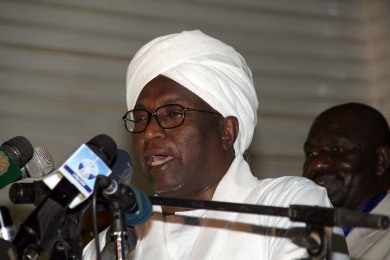Sudan vows to undertake steps to contain domestic religious extremism
August 8, 2015 (KHARTOUM) – The Sudanese presidency announced its intention to unveil a series of steps in consultation with other actors to contain terrorism and religious extremism among younger people,

He stressed Sudan’s commitment to moderate Islam and their rejection of fanaticism and extremism explaining that the Sudanese society is marked by tolerance, intellectual and religious pluralism.
The Sudanese official noted that they seek to address extremism through dialogue and cited the example of a cell apprehended in 2012 in al-Dandar Wildlife Park in the central state of Sennar southeast of the capital Khartoum.
In June of 2014, authorities released 23 of the cell members after they reportedly disavowed their radical views following a series of dialogues conducted by the Sudanese preacher Ahmed Essam al-Bashir.
Abdel-Rahman described the recent waves of Sudanese students joining the Islamic State (ISIS) as limited and attributed it mainly to their upbringing in western countries.
He called on Western countries to review their “unjust” attitudes toward others while working to find a solution to the Palestinian issue and foster a spirit of tolerance in lieu of instilling hatred and strife.
“Islam warned more than any other religion of extremism,” Abdel-Rahman said.
He also urged the west to review their campaigns against Muslims before labeling others as sponsors of terrorism.
“Who supported al-Qaida in the face of the Soviet Union? Who now supports ISIS with modern instruments and equipment?” he asked.
The 2nd VP accused Western circles of supporting terrorism and religious extremism and appealed for dialogue, consultation, tackling poverty and unemployment and to fight corruption.
ISIS presence in Sudan has made the headlines last March after dozens of medical students from Sudanese origins entered Syria via Turkey to work in hospitals under the control of ISIS.
More students were discovered to have sneaked to Syria in subsequent months including the daughter of a senior diplomat drawing accusations of official circles deliberately facilitating it.
(ST)
